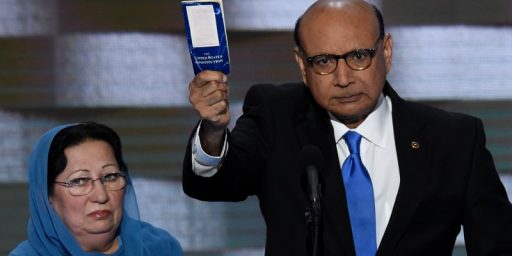Federal Judge Not Buying Administration Arguments In Lawsuit Over Drone Killings
A Federal Judge wasn't very pleased when Administration lawyers told her that she doesn't have jurisdiction to hear a lawsuit over the President's drone policy.
A Federal Court Judge in Washington, D.C. is expressing skepticism about the Federal Government’s argument that the Courts have no jurisdiction to review the Obama Administration’s claim that they have no jurisdiction to review cases involving targeted drone strikes:
WASHINGTON — A federal judge on Friday sharply and repeatedly challenged the Obama administration’s claim that courts have no power over targeted drone killings of American citizens overseas.
Judge Rosemary M. Collyer of the United States District Court here was hearing the government’s request to dismiss a lawsuit filed by relatives of three Americans killed in two drone strikes in Yemen in 2011: Anwar al-Awlaki, the radical cleric who had joined Al Qaeda in the Arabian Peninsula; Mr. Awlaki’s 16-year-old son, Abdulrahman, who had no involvement in terrorism; and Samir Khan, a 30-year-old North Carolina man who had become a propagandist for the same Qaeda branch.
Judge Collyer said she was “troubled” by the government’s assertion that it could kill American citizens it designated as dangerous, with no role for courts to review the decision.
“Are you saying that a U.S. citizen targeted by the United States in a foreign country has no constitutional rights?” she asked Brian Hauck, a deputy assistant attorney general. “How broadly are you asserting the right of the United States to target an American citizen? Where is the limit to this?”
She provided her own answer: “The limit is the courthouse door.”
The case comes to court at a time when both the legality and wisdom of the administration’s use of targeted killing as a counterterrorism measure have come under question in Congress and among the public. The debate, including the first public discussions of drone strikes by Congress and a major speech by President Obama on May 23, has raised the possibility of a role for judges in approving the addition of Americans to the so-called kill list of suspected terrorists or in signing off on strikes.
Mr. Hauck acknowledged that Americans targeted overseas do have rights, but he said they could not be enforced in court either before or after the Americans were killed. Judges, he suggested, have neither the expertise nor the tools necessary to assess the danger posed by terrorists, the feasibility of capturing them or when and how they should be killed.
“Courts don’t have the apparatus to analyze” such issues, so they must be left to the executive branch, with oversight by Congress, Mr. Hauck said. But he argued, as Attorney General Eric H. Holder Jr. has in the past, that there are multiple “checks” inside the executive branch to make sure such killings are legally justified.
Judge Collyer did not buy it. “No, no, no,” she said. “The executive is not an effective check on the executive.” She bridled at the notion that judges were incapable of properly assessing complex national security issues, declaring, “You’d be surprised at the amount of understanding other parts of the government think judges have.”
This isn’t the first time the al-Alwaki matter was before a Federal Court, of course. In 2010, when it became public knowledge that Anwar al-Alwaki was one of the people on a list of those selected for possible targeted killing by the United States military, members of his family enlisted the assistance of the American Civil Liberties Union and other groups in an effort to either get an injunction against efforts to kill him, or require the Administration to show some kind of probable cause to justify its decision to mark al-Alwaki for assassination. After several procedural moves by the Administration designed to prevent the lawsuit from even going forward, another Judge serving on the same court as Judge Collyer dismissed the lawsuit on the grounds that the parties who brought the case lacked standing to do so even while conceding that the case raised important issues.
Many of the same parties that were involved in that lawsuit are involved in this one:
[The Plaintiffs] are Nasser al-Awlaki, father and grandfather of two of the men killed, who wrote about their deaths on Wednesday in The New York Times, and Sarah Khan, mother of Samir Khan. Only Anwar al-Awlaki was deliberately targeted, officials say; Mr. Khan was killed in the same strike, while Abdulrahman al-Awlaki was killed by mistake in a strike officials say was intended for a suspected terrorist who turned out not to be present.
The relatives filed suit late last year, but not against the military and the Central Intelligence Agency, which carried out the strikes, because such lawsuits usually fail on technical grounds. Instead, they sued four officials in charge of the agencies at the time: David H. Petraeus, the former C.I.A. director; Leon E. Panetta, the former defense secretary; and two successive heads of the Joint Special Operations Command, Adm. William H. McRaven and Lt. Gen. Joseph L. Votel.
The lawsuit is known as a Bivens action, after a 1971 Supreme Court ruling that permitted citizens to sue government officials personally under some circumstances for violating their constitutional rights.
The government is asking that the lawsuit be dismissed on several grounds. Mr. Hauck said decisions about targeted killing should be reserved to the “political” branches of government, the executive and legislative, not the judiciary. In addition, he said, allowing a lawsuit against top national security officials to proceed would set a dangerous and disruptive precedent.
“We don’t want these counterterrorism officials distracted by the threat of litigation,” he said.
Pardiss Kebriaei of the Center for Constitutional Rights and Hina Shamsi of the American Civil Liberties Union, representing the plaintiffs, argued that the claims had extraordinary importance because they involved the deaths of Americans at the government’s hands. “The entire goal of Bivens is deterrence,” to discourage officials from infringing the rights of Americans, Ms. Shamsi said.
“The court still has a role to play in adjudicating whether or not a citizen’s rights have been violated,” she said.
You would think that they do, but the way the law has treated cases like this has been far more sympathetic to the idea that government officials acting under the claim of “national security” should be given virtually unfettered discretion to do whatever they believe to be appropriate and that it would be wrong to “distract” them with the “threat of litigation.” After all, why should they have to worry about a Constitution when they’re a “war on terror” to fight, right?
The problem, of course, is that if the Courts aren’t going to review these matters, or provide relief to people seeking to find out the truth, then who is? Congress certainly isn’t doing its job in this area. Yes, there is supposedly oversight from the House and Senate Intelligence Committees but those proceedings are generally closed to the public. While there are certainly appropriate reasons for that, such secrecy also calls into question just how thorough the oversight that this process provides actually is. For the most part, operations like the one against al-Alwaki are decided solely by the President and those working under him and the Intelligence Committees (and in some cases the leadership of both Chambers of Congress) are informed about it either before or after the fact. There seems to be very little attempt by anyone in Congress to question how those decisions are made, or why, or why particular people may be put on a Presidential “Kill List.”
I’m not sure what the answer is here. The Constitution gives Presidents broad authority in the area of defense and foreign policy, and throughout the course of American history American Presidents have claimed more and more power with little opposition from Congress. Because of that, decisions like the one that dismissed the initial al-Alwaki lawsuit end up being largely inevitable. Indeed, it’s far from certain that Judge Collyer will be able to do much of anything in the case before her or that she wouldn’t be overruled on appeal if she did. On some level, there’s something wrong about that because it essentially means that, acting under the rubric of the “war on terror,” the Executive Branch has virtual carte blanche to act however it wishes. That may make some people feel safer, but it shouldn’t make any of us feel that our liberty is secure.






That’s the money quote right there. The very concept is laughable.
@Ben: I don’t think another damned word need be said.
Does a federal judge have authority over the commander in chief? If so, the US could be in trouble if attacked.
@Tyrell: Courts acting as a check on the other two branches has worked for over two hundred years.
And no, the President is not Supreme Warlord of the Universe.
Howdy. Sorry to bother you but I ran across your website
and noticed you happen to be using the exact same theme as
me. The only problem is on my blog, I’m struggling to get the style and design looking like yours. Would you mind contacting me at: ch************@my********.com so I can get this figured out. By the way I have bookmarked your web-site: https://www.outsidethebeltway.com/federal-judge-not-buying-administration-arguments-in-lawsuit-over-drone-killings/ and will certainly be visiting often. Thanks alot :)!
You are so interesting! I don’t believe I’ve read through a single thing like that before.
So great to find another person with a few unique thoughts on this
issue. Really.. many thanks for starting this up. This site is one thing
that’s needed on the internet, someone with a bit of originality!
This is just one of the many things I have come to dislike about America. What happened to “with Liberty and Justice for ALL“?